A Zoom panel hosted by the LWV, YWCA and Greenwich Association of Realtors on Wednesday included Greenwich P&Z director Katie DeLuca and commission chair Margarita Alban, along with Tom Heagney and Sara Bronin, founder of DeSegregate CT, the group who worked to craft the statewide zoning legislation SB 1024.
The Zoom panel took place simultaneously while the State Planning and Development committee met to discuss and vote on the bill.
In fact the committee voted on an amended version of SB1024 in the middle of the Zoom panel.
The amended version removed two key elements: Transit Oriented districts and Main Street corridors.
SB 1024, also known as the DeSegregate CT bill, was created with the goal of increasing affordable housing, but concerns arose that it would increase density but not affordability in towns like Greenwich where land prices are extremely high.

Ms Alban explained during the Zoom panel that the original language of SB1024 was to allow, “as of right,” (in towns with populations over 7,500), no minimum parking requirement on developments of at least 4 units, in at least 50% of the lot area, within a 1/2 mile of the primary transit station, such as train station, bus depot or ferry terminal. In Greenwich, all eyes were on the Greenwich train station and DeLuca shared a graphic that highlighted the 1 mile area and its single family (13%), two-family (18%) and multi-family (52%) housing.
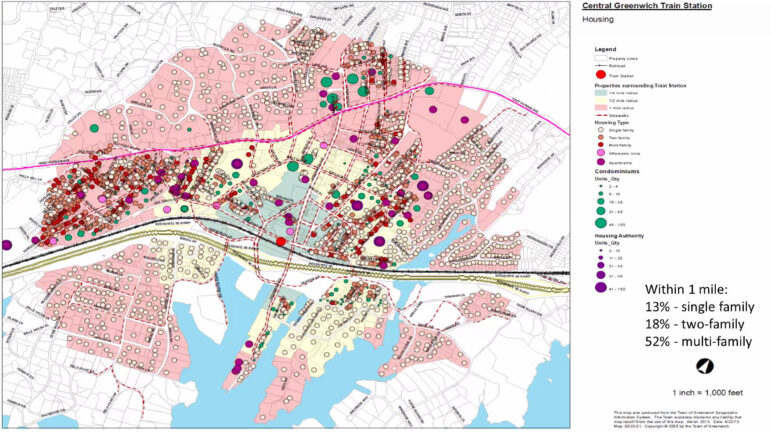
“As-of-right” means that there would be no public hearings or public comment in connection with these new developments.
Also, as originally drafted, SB 1024 included a requirement that would kick in at 10+ units. When a developer hits 10 units, 10% would have to be affordable.
Alban said the town had already heard from a developer eager to build a 9-unit building.
“Unless that changes a little bit, we would be seeing the 9-unit luxury units we’re so worried would take away our diversity,” Alban said during the Zoom talk. “We’ve lost middle housing. Little houses come down and the luxuries come up.”
Alban said towns should have the freedom to decide their own affordability requirements.
Land Use Attorney Tom Heagney agreed and said the transit district provision would result in removing de facto existing affordable housing in the two-family R6 zone, which exists in the center of town near the main train station.
“If we were to have this type of regulation in the center of town, much of that development the commission was concerned about when it removed multi-family in the R6 zone 10 years ago would occur, and you’re going to get much denser housing, but you’ll have less affordable housing and much less diverse housing,” Heagney said. “There’s an irony there that you increase the number of units…Going from $3 million a unit to $2 million a unit is not what we have in mind here.”
As originally drafted, SB1024 mandated towns to create a “Main Street” corridor that would feature triplexes, and density of 15 units per acre would be permitted.
The original bill required zero parking for multi-family dwellings, and Alban noted Greenwich was already very tight for parking in certain areas of town including the Post Road and lower Greenwich Avenue by the train station.
Also, P&Z commissions would have also been required to conserve sewer capacity for the new as-of-right development instead of utilizing capacity for larger mixed use, mixed income projects with affordable units included.
Ms Alban said there were four key issues with SB 1024.
She agreed with Mr. Heagney that mandating locations for multi-family housing and “middle” housing was problematic. She noted that towns should decide where development was most suitable, and that it might not be around a primary train station or “Main Street” corridor.
She said Greenwich was already built out and had limited redevelopment opportunity. It also has both sewer and flood zone constraints.
Ms Bronin gave as an example the former Pickwick Theater, which was later a bowling alley, and is now Pickwick Commons, as an example a multi family development being stymied by parking requirements. (P&Z Watch: Historic Building to be Repurposed as Residential, Parking Access via Car Elevator, March 23, 2021)
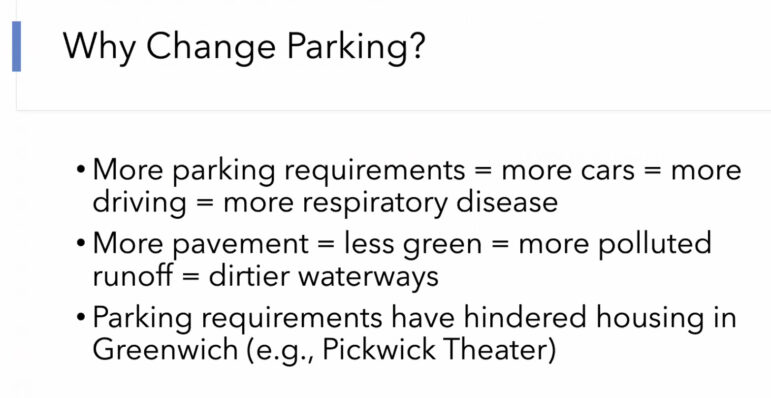
Ms Alban said another concern was that “as of right” developments preclude public hearings, which result in valuable input from residents familiar with neighborhoods would be lost.
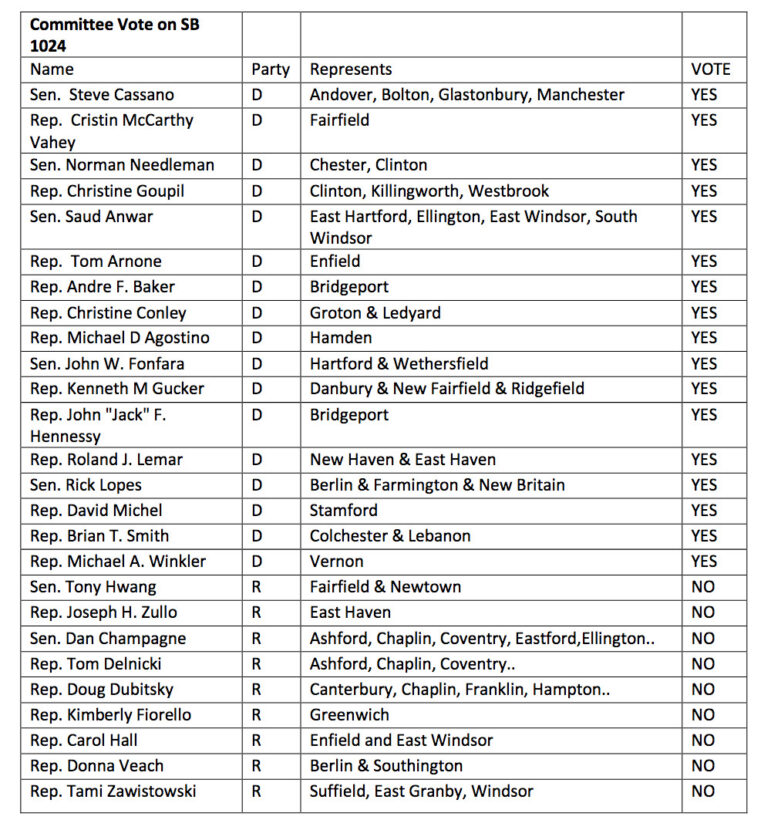
In the middle of the panel discussion, Ms Alban shared the news that the State’s Planning & Development Committee had voted to advance a modified version of 1024.
The vote was along party lines 17-9, with Democrats favoring the bill.
The amended bill took out provisions requiring both Main Street and Transit Oriented District housing.
This eliminated the “as of right,” multi family transit district mandate and provisions disallowing towns from requiring any off-site parking around “Main Streets.”
Bronin said she and her team would work to have the as-of-right multi-family without parking inserted back into the bill before it is voted on by the full legislature.
Also eliminated from the bill was a requirement that P&Z commissioners to undergo training, though that was inserted into another bill.
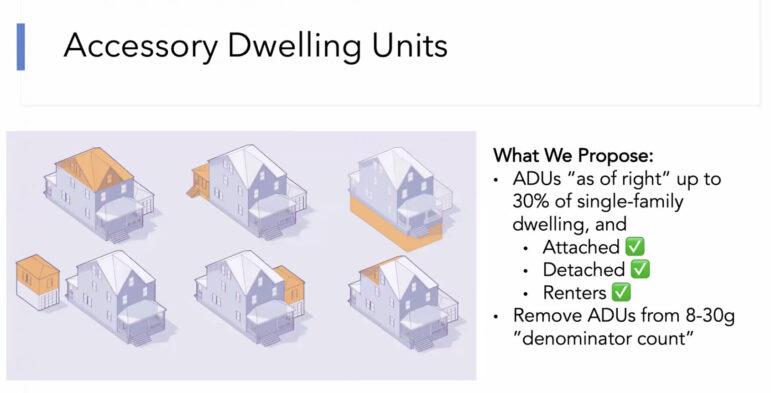
The requirement for towns to allow accessory dwelling units “ADUs” also remained in the bill. Residents would simply work with staff for approval, rather than go before P&Z commissions.
This part of the bill hadn’t received much objection, though State Rep Joe Zullo had said he feared residents would add them for the purpose of AirBnb for a revenue stream.
For her part, Ms Bronin, an architect and attorney was previously chaired the City Hartford P&Z commission for 7 years, and is married to the Mayor of Hartford, said ADUs could significantly increase the value of a single family home. She also said multi family housing would increase the value of single family homes in the same neighborhood. They also allow streetscapes to stay in tact.
Ms Bronin said a town could create zoning to prevent people from using ADUs for AirBnb or other short term rentals.
A recent workshop in Greenwich about short term rentals and AirBnb revealed that creating an ordinance was not so simple. There are about 300 of these rentals in town.
During the Zoom panel, Ms Alban said even prior to learning the bill had moved favorably out of committee that Greenwich was already working to revise its accessory dwelling unit regulation, which is currently designed to attract young people and allow elderly to age in place.
“We will take out the age and affordability restriction,” Alban said. “I hate to give up the affordability because I don’t think we’re going to get any otherwise, but it does serve a societal need.”
Katie DeLuca said the main restriction she would like removed was for units have to be in housing in place for 5 years.
“The concern initially was that we’d have two-family housing all over the community,” DeLuca said.
Ms Bronin noted that Greenwich has only 100 ADUs.
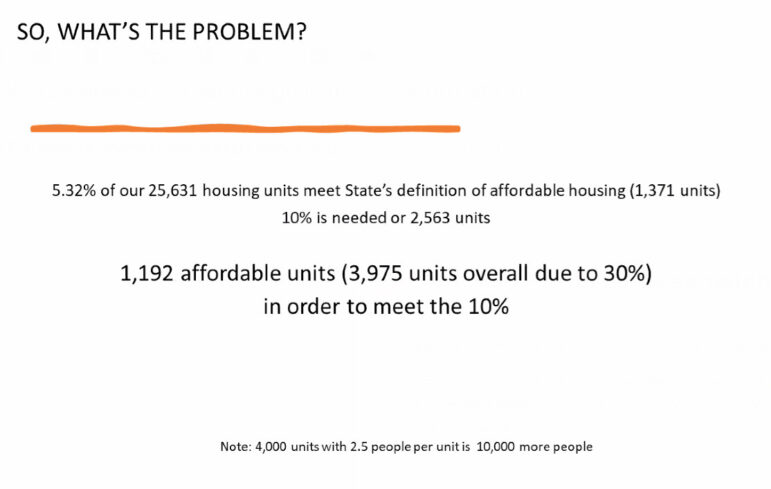
There was also language exempting ADUs from the denominator in 8-30g calculations, which is significant because if ADUs proliferate and count toward a town’s overall housing count, the 10% goal set by 8-30g might become further and further out of reach. During the presentation, it was noted Greenwich needs about 1,200 Affordable units to be in compliance.
The modified bill also includes language for a working group to design a model zoning code for the state. The code would be optional for towns to adopt.
Reached by phone on Thursday, Westport’s P&Z director Danielle Dobin reacted to the passage out of the Planning & Development committee of the modified bill saying, “I am relieved bill was advanced out of committee without the really harmful provisions that would have limited future opportunity for the development of mixed income, multi-family and supportive housing in towns like Westport.”
“The mandate to permit as of right multi-family without parking in single family neighborhoods has been removed,” she added.
“Towns in Fairfield County and across Connecticut have limited redevelopment capacity based on infrastructure concerns, sewage capacity, and proximity to coastal areas including low lying neighborhoods in the flood zone, etc,” Dobin added.
“It’s critical that around train stations and Main Streets that towns can properly plan as required by 8-30-J for a diversity of housing,” she continued, adding that would require towns to create affordability plans. “And precious sewer capacity isn’t taken up by market rate or luxury units when it is needed for affordable housing and supportive housing.”
Ms Dobin also said she was delighted to see that SB 6611, also known as the Fair Share Plan, had advanced.
“This bill, proposed by longtime advocates for affordability in Connecticut, will finally receive a fair hearing now that the legislature is properly focused on affordability once again.”
This bill proposes a completely different process than 8-30(g) (though as drafted now it doesn’t replace 8-30g) to determine the amount of affordable housing each Connecticut municipality should create, and leaves it to each town to create a 10 year plan toward achieving their “Fair Share” goal.
Another bill, HB 6107 prohibits consideration of the word “character” in zoning decisions. It would create a working group to look at affordable housing statewide. A modernization of 8-30g might stem from this.
SB 6570. The Transportation Committee advanced a bill that would require towns to look at state owned land near transit stations in their 8-30j affordability plans and empowers the Dept of Transportation to utilize 5 lots from across the state, to plan for mixed income housing while retaining existing parking spaces.
This bill initially contained the similar “as of right” multifamily language as SB 1024, but this language was removed, which is helpful for fully built out towns like Greenwich.
On Thursday DeSegregate CT send an email to subscribers referring to the passage of the modified bill as “a milestone,” and saying that both transit oriented district and Main Street corridor items were crucial to increasing housing supply and diversity.
DeSegregate CT scheduled a press conference for 2:30 on Thursday.
Next, SB 1024 will be scheduled for the house calendar.